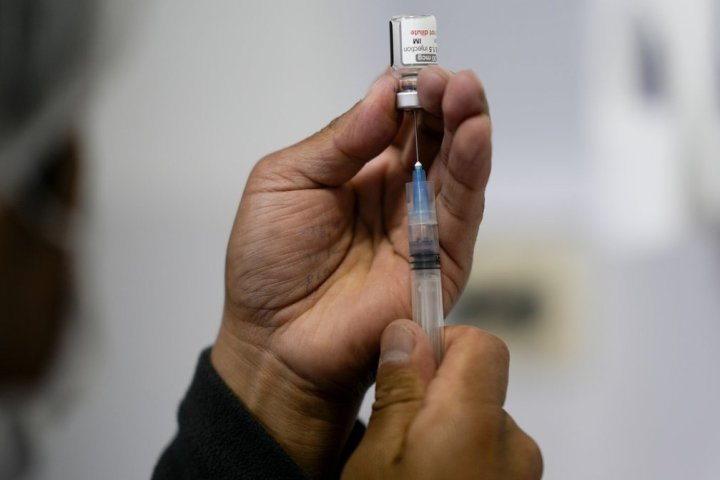Health
U.N. Reports 14 Million Children Miss Vaccinations in 2024

More than 14 million children worldwide did not receive a single vaccine in 2024, a figure consistent with the previous year’s estimates, according to a report released by U.N. health officials. The World Health Organization (WHO) and UNICEF highlighted that nine countries were responsible for over half of these unvaccinated children, underscoring significant disparities in global vaccine access.
In their annual assessment of vaccination coverage, WHO and UNICEF reported that approximately 89 percent of children under one year old received the initial dose of the diphtheria, tetanus, and whooping cough vaccine, a rate unchanged from 2023. Meanwhile, the proportion of children completing the three-dose series rose slightly to 85 percent, up from 84 percent the previous year. Despite these minor improvements, health officials expressed concern about the impact of reduced international aid on vaccination efforts.
The report comes at a critical time as international humanitarian support has faced significant cuts. In January 2024, President Donald Trump announced the U.S. withdrawal from the WHO, which included freezing nearly all humanitarian aid. Additionally, last month, Robert F. Kennedy Jr., the U.S. Health Secretary, stated that the country would retract billions previously pledged to the vaccine alliance Gavi, citing concerns about the organization’s adherence to scientific standards. Kennedy’s skepticism around vaccines has raised alarms among public health experts, particularly regarding the well-established safety and efficacy of the diphtheria, tetanus, and whooping cough vaccine.
According to U.N. estimates, vaccines prevent between 3.5 million and 5 million deaths annually. Dr. Tedros Adhanom Ghebreyesus, WHO Director-General, noted that “drastic cuts in aid, coupled with misinformation about the safety of vaccines, threaten to unwind decades of progress.”
Global Vaccine Coverage and Regional Disparities
Experts indicate that access to vaccines remains “deeply unequal” across regions, with conflicts and humanitarian crises exacerbating the situation. Notably, Sudan reported the lowest coverage for diphtheria, tetanus, and whooping cough vaccinations. The data revealed that nine countries — Nigeria, India, Sudan, Congo, Ethiopia, Indonesia, Yemen, Afghanistan, and Angola — accounted for 52 percent of all children missing immunizations.
On a positive note, coverage against measles showed a slight uptick, with 76 percent of children globally receiving both doses of the vaccine. Nevertheless, experts stress that vaccination rates must reach 95 percent to effectively prevent outbreaks of this highly contagious disease. The WHO reported that 60 countries experienced significant measles outbreaks last year. In the United States, the current measles outbreak marks the worst in over three decades, while Europe reported 125,000 cases in 2024, doubling the incidence from the previous year.
In a tragic development, British authorities confirmed that a child died from measles in a Liverpool hospital last week. Health officials revealed that despite ongoing efforts to promote vaccination, only about 84 percent of children in the United Kingdom are adequately protected against measles. Professor Helen Bradford of University College London commented, “It is hugely concerning, but not at all surprising, that we are continuing to see outbreaks of measles. The only way to stop measles spreading is with vaccination.”
As the global health community grapples with these challenges, the need for increased vaccine access and public education about their safety has never been more critical.
-

 Politics4 weeks ago
Politics4 weeks agoSecwepemc First Nation Seeks Aboriginal Title Over Kamloops Area
-

 World5 months ago
World5 months agoScientists Unearth Ancient Antarctic Ice to Unlock Climate Secrets
-

 Entertainment5 months ago
Entertainment5 months agoTrump and McCormick to Announce $70 Billion Energy Investments
-

 Science5 months ago
Science5 months agoFour Astronauts Return to Earth After International Space Station Mission
-

 Lifestyle5 months ago
Lifestyle5 months agoTransLink Launches Food Truck Program to Boost Revenue in Vancouver
-

 Technology3 months ago
Technology3 months agoApple Notes Enhances Functionality with Markdown Support in macOS 26
-

 Lifestyle3 months ago
Lifestyle3 months agoManitoba’s Burger Champion Shines Again Amid Dining Innovations
-

 Top Stories2 months ago
Top Stories2 months agoUrgent Update: Fatal Crash on Highway 99 Claims Life of Pitt Meadows Man
-

 Politics4 months ago
Politics4 months agoUkrainian Tennis Star Elina Svitolina Faces Death Threats Online
-

 Sports5 months ago
Sports5 months agoSearch Underway for Missing Hunter Amid Hokkaido Bear Emergency
-

 Politics5 months ago
Politics5 months agoCarney Engages First Nations Leaders at Development Law Summit
-

 Technology5 months ago
Technology5 months agoFrosthaven Launches Early Access on July 31, 2025





















